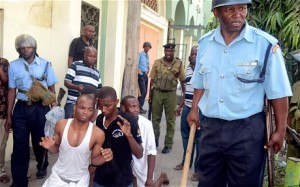Kenya: Enraged Muslim Youths Stage Protest against Police
 A mob of angry Muslim youths on Monday staged another round of protests against the police’s forced raid on the Masjib Musa Mosque in the port city of Mombasa.
A mob of angry Muslim youths on Monday staged another round of protests against the police’s forced raid on the Masjib Musa Mosque in the port city of Mombasa.
Reports indicate that police officers have been pushed to fire tear gas and rubber bullets to disperse the raging group, who have allegedly also attacked the police with stones.
This violent encounter is the result of a contentious raid by police on the renowned mosque yesterday, during which about 129 people were arrested.
According to police sources, the foray into the mosque came as the result of a series of investigations, which hinted that the holy ground was being simultaneously used as a recruitment and training ground for terrorists.
Reports further indicate that the worshippers defied the court’s order not to meet at the mosque on Sunday. Hence the raid.
Henry Ondieki, Mombasa’s chief of criminal investigations has disclosed to a court today that the arrested men will be charged for being part of a criminal organization.
The court has meanwhile granted a request for the suspects to be remanded in custody until Friday, when their hearing officially commences.
There are varying claims that at least one police officer and one terrorist lost their lives during the raid on Sunday.
While the Masjib Musa Mosque has long been linked with a history of radicalism, some pundits believe the police may have exercised wanton force in assessing the venue for alleged threats.
The mosque, in which police claim an al Qaeda-linked flag has been flown, is at the center of the battle against islamic radicalism in Kenya.
Since the attack on Nairobi’s Westgate Mall last year, Kenyan authorities have tightened security in strategic points across the city to attempt to clamp down on radicalism before it takes root.
High unemployment and porous border security have been identified as the two main factors that have supported the growth of terrorist cells in Kenya.
Photo by EPA: Police round up some of men yesterday.